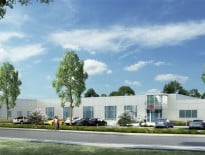Prospects for developing brick and mortar retail are dicey as national chains shrink store footprints and shutter anchor stores amid Amazon’s ascendance.
As leasing begins at Arsenal Yards in Watertown, developer Boylston Properties expects that trendy bistros and high-end fitness concepts will pick up the slack as it seeks to fill 350,000 square feet of storefronts.
“Restaurants are a key component of all our retail centers today and especially something like this on the urban edge,” said Andrew LaGreca, a principal at leasing agent Wilder Cos. of Boston. “Our focus on the sit-down side is going to be more chef-driven, locally-owned restaurants.”
Warning signs have been flashing at retail landlords for years, as traditional apparel and discount-format anchors lose sales to online competitors. The latest blow came from J.C. Penney’s plans to close 138 stores nationwide, following on the heels of Sears’ late-winter announcement of 159 store closings.
The potentially disastrous effects are shaping up as a blessing to mall operators that are savvy enough to replace them with compelling non-traditional tenants, said John Chang, first vice president at Marcus & Millichap Real Estate Investment Services.
“The anchor yesterday may have been a big-box retail space,” Chang said. “Today it may be a fitness center and maybe a few good restaurants. There’s a lot more services, and we’re seeing greater expansion by grocery stores.”
At Arsenal Yards, that’s likely to include a six- to eight-screen cinema, specialty grocer and multiple fitness operators, LeGreca said.
“Experiential retail where people want to come out is important in every retail complex,” he said. “Food is such a big component of the retail experience today, but it’s also important to have the Flywheels, the Soul Cycles and the Pure Barres.”
Boylston Properties’ acquired the aging retail property, built in a converted section of the 19th-century Watertown Arsenal complex, and an office building in 2013 for $71 million. A 1980s-era addition that connects two historic buildings will be demolished, and seven new freestanding buildings and two parking garages will be built across sections of the existing parking lot.
And in Medford, New England Development demolished the central section of the Meadow Glen Mall to make way for a 120,000-square-foot Wegmans supermarket scheduled to open this fall.
Boston Retail Rents Top Pre-Recession Levels
The industry doldrums have largely bypassed Boston as retail springs up in newly-emerging neighborhoods on the city’s fringes and in new mixed-use suburban developments.
Marcus & Millichap recently ranked Greater Boston as the third-strongest metro in the U.S. in its 2017 retail index, up from 10th the previous year. The forward-looking index ranks markets based upon factors including anticipated employment growth, vacancy rates, construction activity and rents.
The region’s limited land supply and low retail vacancy rate of 2.7 percent – lower than all 46 metros surveyed except San Francisco – continue to stabilize the market, Chang said. Average asking rents hit $19.71 per square foot in 2016, finally surpassing the pre-recession peak of $19.39.
“It’s a market that tends to be difficult to add more space, and it’s performing very favorably with the existing inventory,” he said. “There’s very little development and it’s very difficult to build.”
Retail development has been dominated by urban in-fill projects such as Boston Properties’ Hub On Causeway, the region’s largest retail project with 235,000 square feet of shops, restaurants and a Star Market as part of a mixed-use development at North Station.
Nearly half of the short-term completions involve suburban properties along the Route 128 and Route 495 belts, reflecting strong job growth in high-wage industries such as life science and finance, Marcus & Millichap said. That’s spurred residential construction and benefited grocery-anchored shopping centers in first-tier suburbs, the report said.
In Back Bay, the region’s traditional highest-rent district, asking triple-net rents are exceeding $300 per square foot on Newbury Street, according to CBRE’s 2017 New England market outlook. Expansions and new development at Copley Place and the Prudential Mall have attracted marquee arrivals such as Eataly, but have pushed up vacancies on Newbury Street, according to the CBRE report. In the fast-developing waterfront, where WS Development is building out lower-level spaces in the Seaport Square master-planned parcels, over 1 million square feet of retail is expected to be completed in the next few years.
And Downtown Crossing’s transformation continues with the arrival of Forever 21, Sweetgreen and Old Navy, pushing asking rents above $200 per square foot for the first time. A pending change of ownership at the former Barnes & Noble store on Washington Street could spur new activity. L3 Capital of Chicago has agreed to buy the property, containing 75,000 square feet of office and retail space on five floors, said Peter Montesanto, a senior vice president at Colliers International Boston.









